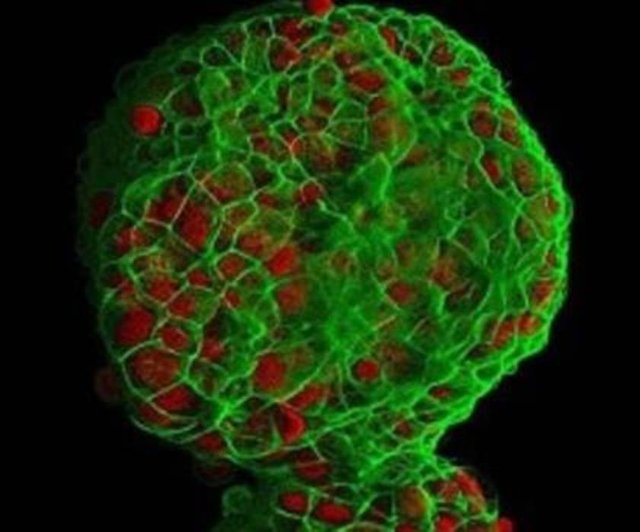Diet can prevent metastases in mom's cancer
An investigation carried out with animals, published in the journal "Nature", has just shown that breast tumors also have their culinary preferences when it comes to spreading. The study has seen that the animals that were deprived of asparagine, an amino acid, a protein block that takes its name from the asparagus, the breast cancer they already suffered almost disappeared.
According to data from the Spanish Society of Medical Oncology (SEOM), in 2017, 28,645 new cases of breast cancer were diagnosed in our country, the most common tumor among Spanish women -and all over the world-. A type of cancer that, likewise, is the first cause of death due to any oncological disease in the female population. A mortality -until 6,477 deaths in Spain in 2016- that is explained mainly by the ability of this tumor to invade other organs - the usual 'metastasis'-. But, now, according to this study led by researchers at the University of Cambridge (United Kingdom), yes. And for that, we would only have to subject the patients to a diet that did not contain the amino acid asparagine.
As Simon Knott, co-author of this research published in the journal "Nature", explains, "our findings, although achieved with an animal model, are linked to the growing evidence suggesting that diet can influence the course of the illness. Thus, and in case our results are confirmed in future studies with human cells, the limitation of asparagine intake by cancer patients could be a strategy to enhance the therapies already available and prevent the spread of breast tumors » .
'Circulating' tumors
Amino acids are molecules that, like pieces of a puzzle, are 'assembled' to form proteins. Thus, amino acids are absolutely necessary for the life of any organism. This is the case of asparagine, which is one of the 22 amino acids encoded in our DNA - that is, it is not an 'essential' amino acid since we can produce it ourselves. However, this asparagine is also found in many foods, such as whole grains, poultry, potatoes, seafood, veal, eggs or legumes. Not so in fruits and vegetables, whose asparagine content is minimal.
In this context, many studies have shown that the vast majority of cancer cells remain in the primary tumor to assist in their growth. However, there are always a few daring cells that break off from this 'original' tumor and slip into the bloodstream to travel through the body and colonize other organs, such as the lung, liver and brain. And once they reach their destination, they will multiply and form new tumors. But, in the specific case of breast cancer, what characteristics do these 'circulating' tumor cells have that differentiate them from those that choose to stay in the primary tumor?
The limitation of the intake of asparagine could be a strategy to enhance the therapies already available and prevent metastasis
To answer this question, the authors used an animal model -ratons- with triple negative breast cancer, that is, the most aggressive and lethal type of tumor that develops in the breast. And what they saw is that the amount of 'asparagine synthetase', which is nothing but the enzyme that cells use to produce asparagine, is directly associated with metastasis. Specifically, the greater the amount of enzyme, the greater the capacity of triple-negative breast cancer to expand throughout the body.
So, is it possible that by suppressing this asparagine synthetase are reduced, or even avoided, metastases? To find out, the authors reduced the amount of enzyme in the animals by means of a dietary restriction or with the administration of an already approved chemotherapy drug - the 'L-asparaginase'. And what happened? Well, the number of metastases was reduced significantly.
It's more; the authors carried out a last experiment in which they fed the animals with foods rich in asparagine. And as a result of this diet, triple negative breast cancer expanded even more rapidly.
As Gregory J. Hannon points out, "our findings suggest that dietary changes may have an impact on both the way the patient responds to treatment and the likelihood that the disease will spread throughout the body."
Beyond breast cancer
In short, the limitation of the diet in the intake could be very useful not only in the treatment of primary breast cancer, but also to prevent, or reduce, the metastasis. So much so that the authors have already launched a clinical trial in which healthy volunteers are following a diet low in asparagine. The objective? See if this type of food effectively reduces the levels of asparagine in the body. If so, the next objective will be to repeat the study, but this time with patients with breast cancer.
However, it is possible that the effects of asparagine are important in the treatment of other types of cancer. As Ravi Thadhani, co-author of the research, points out, "our work could have implications not only for breast cancer, but for many other metastatic tumors."
But there is still more. As concluded by Charles Swanton, clinical director of Cancer Research UK, a British body dedicated to cancer research and responsible for funding this study, "the drug 'L-asparaginase' is used in the treatment of acute lymphoblastic leukemia (ALL). , which is dependent on asparagine. Therefore, it is possible that, although in the future, this drug will be repositioned to help in the treatment of patients with breast cancer ».
